New Ferrari F80 to Challenge Bugatti at 300 MPH
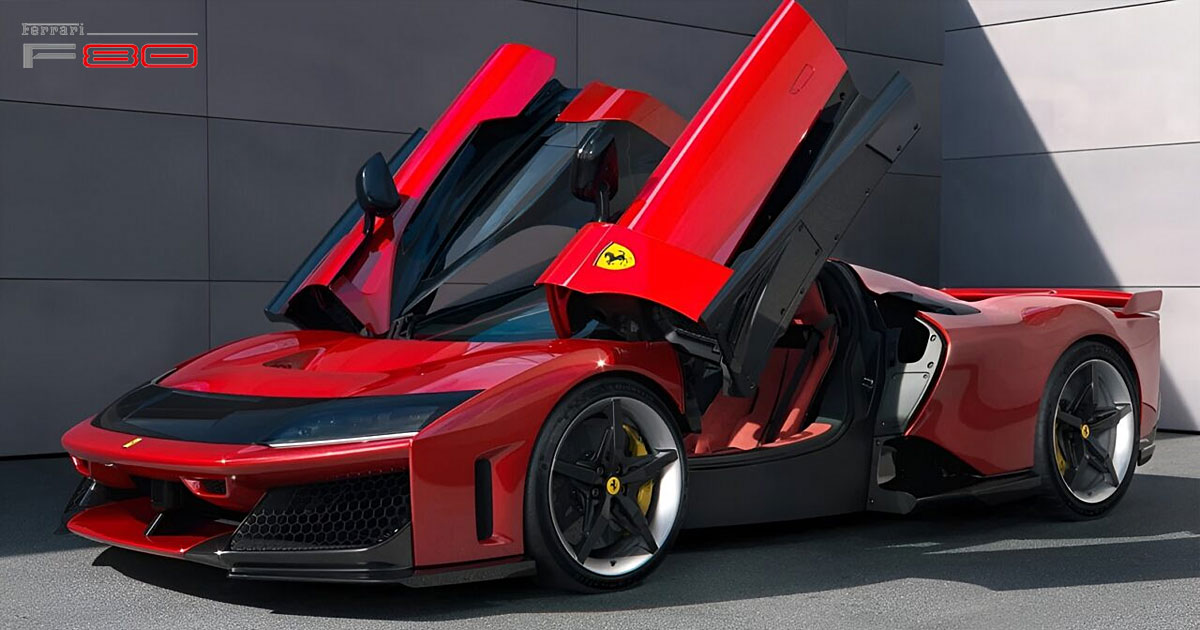
Ferrari Unveils F80: The New Hypercar Pushing 1,200 HP and 300 MPH
Ferrari is back to shake up the hypercar world with the official reveal of the F80, its most advanced and powerful vehicle to date. Positioned as a successor to icons like the F40 and F50, this upcoming hypercar represents a bold leap into the future for Ferrari, blending electrification with race-proven technology. Set to hit the market in 2026, the F80 combines stunning performance with a sleek, futuristic design that pays homage to Ferrari’s rich history while pushing the boundaries of what’s possible.
1,200 Horsepower Hybrid Monster: Ferrari’s New Speed King
At the heart of the Ferrari F80 is a cutting-edge hybrid V6 engine paired with Ferrari’s Kinetic Energy Recovery System (KERS). This system, inspired by the technology used in Ferrari’s Formula 1 cars, is capable of harnessing energy typically lost during braking and converting it into power for the vehicle. Together with the hybrid powertrain, the F80 delivers a staggering 1,200 horsepower, making it Ferrari’s most powerful production car ever.
What sets the F80 apart from its predecessors is its ability to combine blistering speed with advanced energy recovery technology. The hybrid system not only contributes to the car’s jaw-dropping power output but also ensures it remains efficient, showcasing Ferrari’s ongoing commitment to a future of electrified performance.
The F80 is expected to rocket to a top speed of over 300 mph, making it a direct competitor to hypercars like the Bugatti Chiron. With such performance figures, Ferrari aims to reclaim its place as the undisputed king of speed. The F80 is Ferrari’s answer to those seeking unparalleled velocity, razor-sharp handling, and cutting-edge hybrid technology in one incredible package.
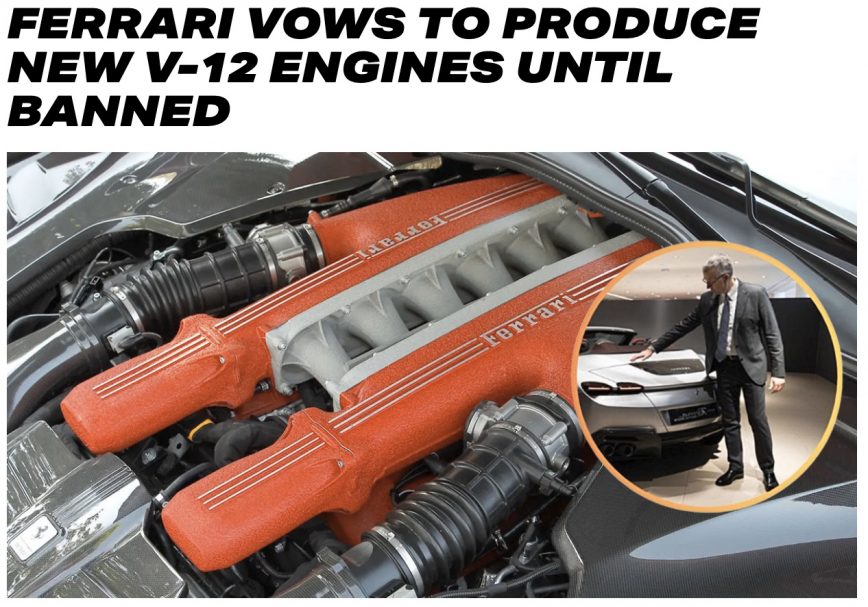
Futuristic Design Inspired by Ferrari’s Legacy
While the performance stats are mind-blowing, the F80’s design is equally breathtaking. The car features aggressive, aerodynamic lines that reduce drag and increase downforce at high speeds. Drawing inspiration from the LaFerrari and Ferrari’s illustrious hypercar lineage, the F80 brings a new level of futurism to the road.
The F80’s body is sculpted for both speed and aesthetics, with boxy wheel arches, sharp creases, and large air intakes for cooling. The front end has a menacing presence, with slim, angular headlights and a low-slung profile that hugs the pavement. The rear, meanwhile, features a prominent Ferrari logo and an innovative spoiler that aids in high-speed stability.
Ferrari has masterfully blended its iconic design language with modern aerodynamic principles, ensuring the F80 not only looks the part but performs at the highest level. The materials used in the car’s construction, such as carbon fiber, ensure the hypercar remains lightweight, contributing to its incredible speed and handling capabilities.
Race-Derived Technology for the Ultimate Driving Experience
Ferrari’s extensive Formula 1 expertise plays a critical role in the development of the F80. From its hybrid KERS system to its advanced suspension and braking technologies, the F80 takes direct cues from the racetrack. The vehicle’s suspension has been fine-tuned for exceptional handling, enabling the F80 to stick to the road like a true race car.
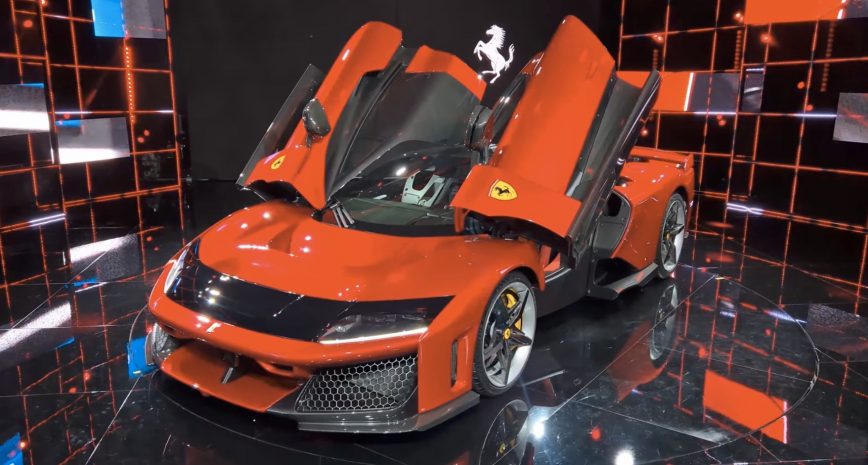
Ferrari’s engineers have also integrated a range of advanced driving aids into the F80, including active aerodynamics that adjust to driving conditions in real-time, ensuring optimal performance whether on the track or the open road. The steering and braking systems have been engineered for razor-sharp precision, allowing drivers to feel completely in control even at blistering speeds.
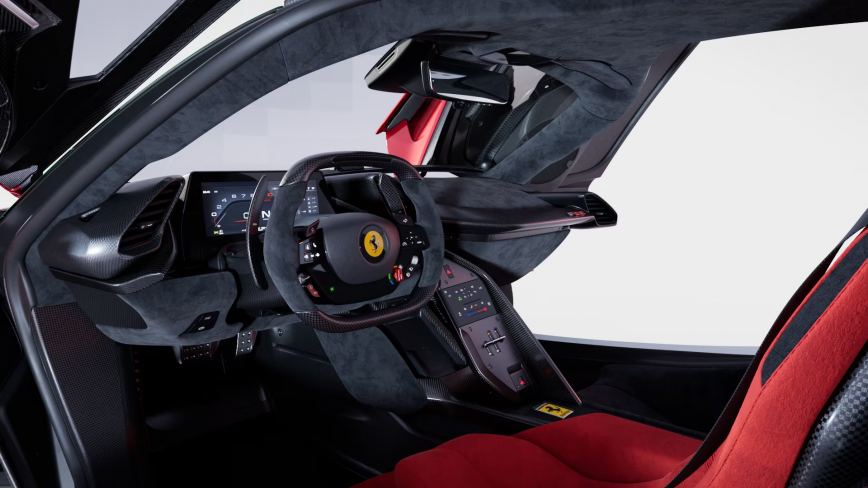
The F80’s interior is designed to be as driver-focused as possible, with minimal distractions and maximum functionality. High-tech displays give the driver all the information they need at a glance, while the carbon-fiber steering wheel brings a race-car feel to the cockpit. Every element of the F80 is designed to enhance the driving experience, making it not just a hypercar but a true Ferrari.
Pushing Toward an Electrified Future
The F80 isn’t just another hypercar—it represents Ferrari’s continued evolution toward electrification. By combining a high-powered traditional engine with hybrid technology, Ferrari is able to maintain its reputation for performance while embracing the future of energy-efficient vehicles. The F80’s hybrid system is a key part of Ferrari’s broader plan to introduce more hybrid and fully electric models in the coming years. Photo Credit – Shmee150
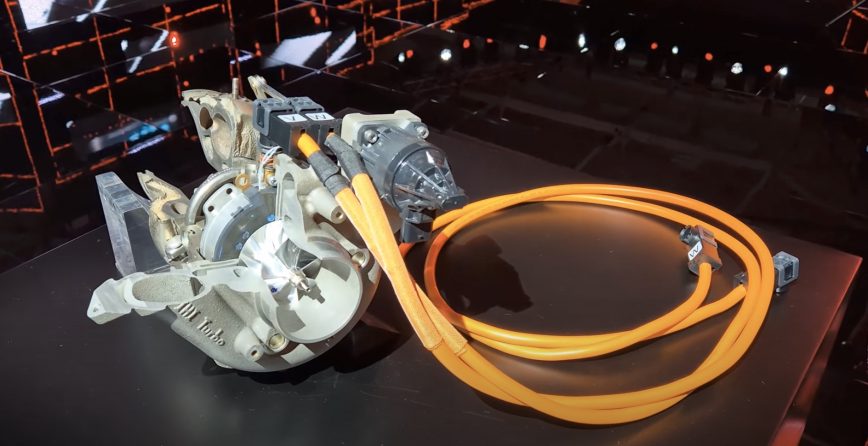
While Ferrari is known for its iconic V12 engines, the shift toward hybrid powertrains represents a significant moment in the brand’s history. The F80 demonstrates that Ferrari can maintain its legendary performance while moving toward more sustainable technologies, paving the way for the company’s future.
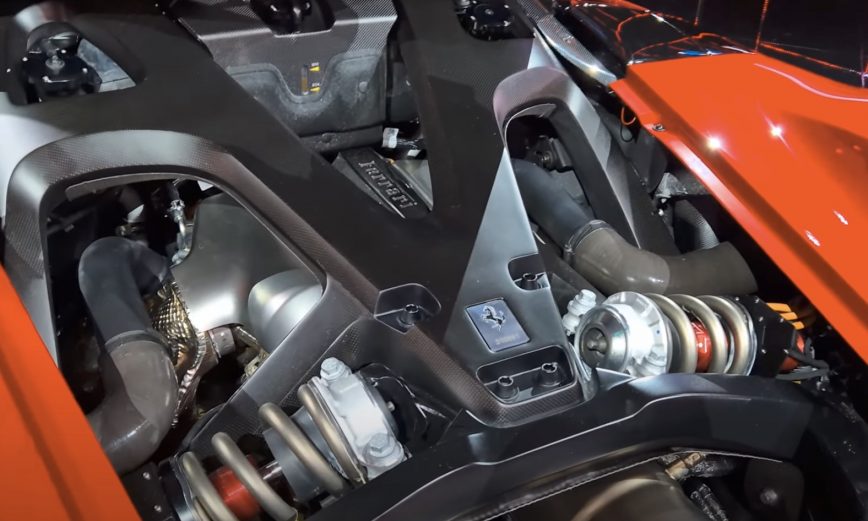
Ferrari plans for a significant portion of its lineup to be electrified by 2026, making the F80 a major milestone in this transition. Despite its hybrid engine, the F80 remains true to Ferrari’s core values of speed, power, and driving excitement, proving that hybrid technology doesn’t have to mean compromising on performance.
Exclusive Price Tag for a Select Few
The Ferrari F80 won’t come cheap. With a starting price of around $3.9 million, this hypercar is aimed squarely at a select group of collectors and enthusiasts who demand the very best. For those fortunate enough to get their hands on one, the F80 offers an unmatched driving experience that few other cars can rival.
Ferrari’s reputation for exclusivity is well-earned, and the F80 is no exception. With its combination of breathtaking performance, advanced technology, and futuristic design, the F80 will undoubtedly become one of the most sought-after hypercars in the world. While only a select few will get to experience the F80 firsthand, its impact on the automotive world will be felt far and wide.
A New Chapter in Ferrari’s Hypercar Legacy
The Ferrari F80 is more than just a new hypercar—it’s a statement. It marks a new chapter in Ferrari’s history, blending cutting-edge technology with the brand’s iconic performance heritage. With its 1,200 horsepower hybrid engine, top speed of over 300 mph, and futuristic design, the F80 pushes the limits of what a hypercar can be.
Ferrari has always been at the forefront of automotive innovation, and the F80 is no different. By combining race-derived technology with electrification, Ferrari has created a hypercar that not only pays homage to its past but also points to the future of performance. For fans of Ferrari and automotive enthusiasts alike, the F80 represents the next evolution of speed, power, and engineering excellence
FERRARI F80 – TECHNICAL DATA SHEET
ENGINE
INTERNAL COMBUSTION ENGINE (ICE)
Type V6 – 120° – dry sump
Total displacement 2992 cc
Bore and stroke 88 mm × 82 mm
Maximum power 900 cv at 8750 rpm
Maximum torque 850 Nm at 5550 rpm
Maximum engine speed 9000 rpm (dynamic limiter at 9200 rpm)
Compression ratio 9.5:1
Specific power output 300 cv/l
HYBRID POWERTRAIN
Type Concentrated winding stator, Litz wire and stator and rotor in a Halbach array configuration
REAR ELECTRIC MOTOR (MGU-K)
Operating voltage 650 – 860 V
Peak power Regenerative braking: 70 kW (95 cv); ICE assist: 60 kW (81 cv)
Peak torque 45 Nm
Maximum engine speed 30,000 rpm
Weight 8.8 kg
FRONT AXLE ELECTRIC MOTOR
Operating voltage 650 – 860 V
Peak power 105 kW (142 cv) for each of the two electric motors
Peak torque 121 Nm
Maximum engine speed 30,000 rpm
Weight 12.9 kg
HIGH-VOLTAGE BATTERY
Maximum voltage 860 V
Maximum power (charge/discharge) 242 kW
Energy 2.28 kWh
Maximum current 350 A
Power density 6.16 kW/kg
Weight 39.3 kg
WEIGHTS AND DIMENSIONS
Length 4840 mm
Width 2060 mm
Height (in kerb weight conditions) 1138 mm
Wheelbase 2665 mm
Front track 1701 mm
Rear track 1660 mm
Dry weight* 1525 kg
Dry weight/power ratio 1.27 kg/cv
Weight distribution 42.2% front / 57.8% rear
Fuel tank capacity 63.5 litres
Luggage compartment capacity 35 litres
TYRES AND WHEELS
Front 285/30 R20
Rear 345/30 R21
BRAKES
Front 408 x 220 x 38 mm (6 pistons per calliper)
Rear 390 x 263 x 32 mm (4 pistons per calliper)
TRANSMISSION AND GEARBOX
8-speed dual-clutch F1 DCT
ELECTRONIC CONTROLS
SSC 8.0: TC, eDiff, SCM, PCV 3.0, FDE 2.0, EPS, ABS-Evo in all Manettino modes, 6D sensor
performance ABS/ABD
PERFORMANCE
Maximum speed 350 km/h
0–100 km/h 2.15 s
0–200 km/h 5.75 s
100-0 km/h 28 m
200-0 km/h 98 m

